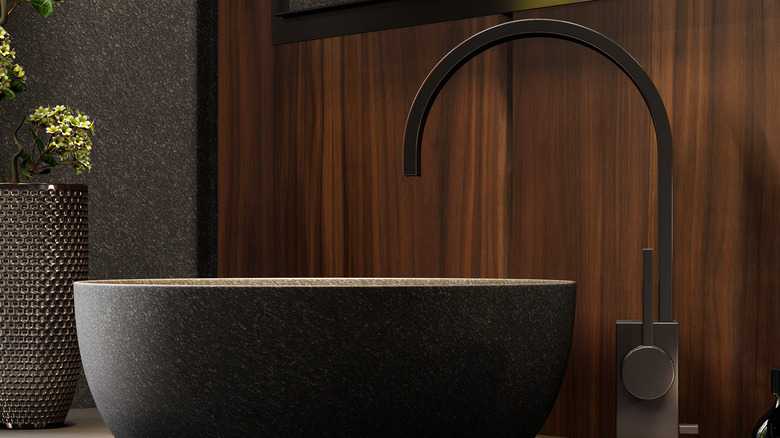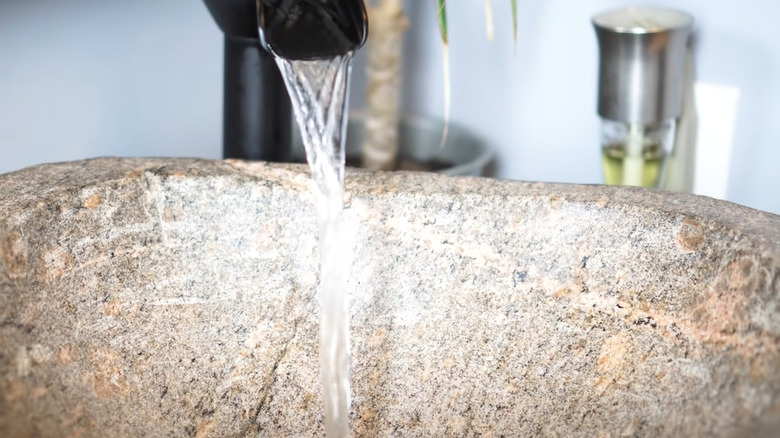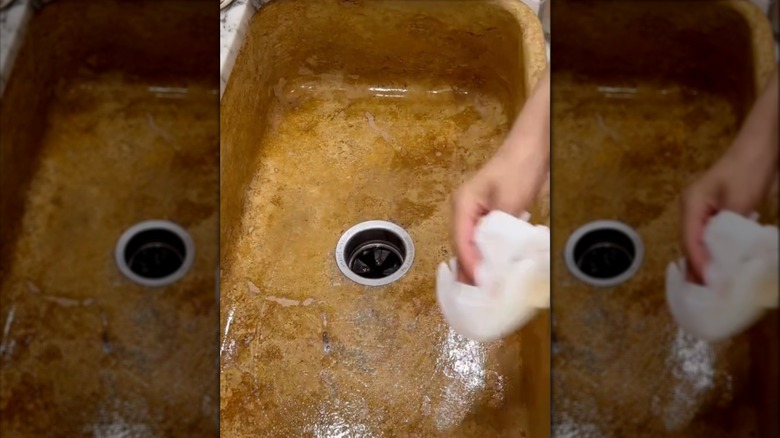Everything You Should Know Before Splurging On A Stone Kitchen Sink
Are you looking for kitchen sink ideas to transform your space from blah to beautiful? There are many materials to consider, and it's beneficial for every homeowner to be familiar with the possibilities. With that in mind, if the gorgeous option of stone is not yet on your radar, maybe it should be.
Why is stone a standout sink choice? For one, everybody loves stone sinks. Two, if you have stone countertops or other stone detailing in your kitchen, luxurious stone sinks pair beautifully for a cohesive look that will give off expensive eatery vibes. Alternatively, it could be an artsy detail that truly pops in a more minimalistic kitchen. That said, since stone is one of the more unique sink material options for kitchen sinks, you'll have to splurge on the investment — it's not cheap. The average kitchen sink installation costs between $216 and $640, and natural stone sinks have significantly higher prices than typical, less exciting materials. So, you'll likely have to spend at least $1,000 (though usually at least $2000) on a stone kitchen sink in addition to the installation price. Considering the hefty price tag, you should know the pros and cons before deciding whether or not to commit to a natural stone sink, and here's what you need to know.
Benefits of stone sinks include reliability and desirability
Anyone who feels like they can't catch a break from having to fix dents and dings in their current sink should know that stone is a very durable kitchen sink material. Since natural stone is so sturdy, these bold kitchen sinks will be less prone to wear and tear damage than other, cheaper choices. Due to that durability, your stone kitchen sink should not require frequent repairs or replacements. Meanwhile, a lower quality, significantly less attractive sink would probably require you to spend a lot on fixes. Thus, if you play the long game, even though a stone sink is initially super expensive, it will likely require you to pay less for repairs or replacements in the long run — in terms of interior design enthusiast math, that's a fair deal!
However, if you're looking to sell your house? Don't sweat the stone sink then, either. A natural stone kitchen sink will likely make your home more desirable to potential buyers if and when you decide to sell, making it a worthwhile purchase either way. In addition, natural stone material is relatively convenient for cleaning, making your life easier in the kitchen (on a day-to-day basis, anyway). Also, the stone material is so stunning that it should make spending time in your kitchen more enjoyable. Nonetheless, before you get swept away by the exciting benefits, remember that these glamorous sinks aren't without their downsides.
Don't ignore the drawbacks regarding practicality and installation
At this point, you might think stone sinks are perfect. They're not. Even though stone sinks are definitely a non-traditional kitchen element that will make a statement — and they tend to be long-lasting and decent for everyday cleaning — there's one big defect you might not realize: you're supposed to seal the stone sink again every one or two years. If you aren't willing to commit to consistent re-sealing, stains could pop up on your expensive sink — and even grosser, bacteria issues, due to the porous material. If the sealing requirements are already making you nervous, a stone sink probably isn't a good choice for your home.
Stone sinks also tend to be extremely heavy, so you'll have to ensure that the size and weight will be doable for your kitchen's setup and countertops. Plus, these extravagant sinks are not the easiest to install, so if you were planning on trying to DIY the installation process alone to save some money, you'll likely have to think again. Therefore, before splurging on a lovely-looking stone sink for the kitchen, every homeowner should carefully consider whether the stunning item will be a worthwhile, pragmatic choice for their kitchen and lifestyle.


